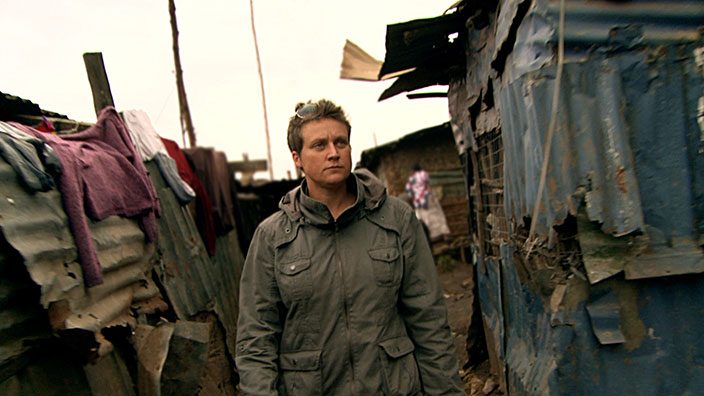Judy Rymer Speaks On the Making Of “I Will Not Be Silenced”
You call yourself a Christian,” she sneered as she lay bare, his silver cross skimming her face. In confidence she reached out and grabbed the charm, holding it steady as her thoughts cast into overdrive. This was not the last time Charlotte Campbell would look into the eyes of her rapist, but it was the last time she would do so as a victim.
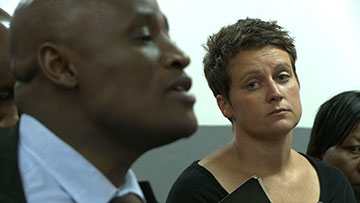
The seriousness of Charlotte Campbell’s case was met with disdain from the defense attorney Mr. Ondeiki who, among other incidents, was known to skip sessions and ignore evidence.
When Campbell approached the authorities for help after her horrific ordeal, the response was disturbing. “Leave the country. No one wins rape cases here in Kenya,” she was told.
“It was that one comment,” Charlotte says, “that propelled me onto another path – to seek justice for myself and other women.”
So when the white Australian took the stand in a cramped Kiberan courtroom and began her testimony, she unleashed a tremor that would forever transform the East African nation of which she had become a vital part. Her extraordinary 7-year legal battle for justice is the subject of Judy Rymer’s award-winning film “I Will Not Be Silenced.”
Distinguished Australian filmmakers Judy Rymer and Lois Harris were working late one evening when Campbell’s press release ran through their newswire. The two immediately locked eyes – three weeks later they were in Nairobi.
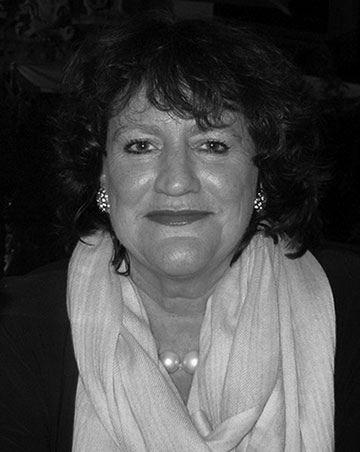
Producer Judy Rymer boasts a renowned track of films including Raising Our Kids, Being Chen Kaige and All Points of the Compass.
“This was a film we knew we should be making,” says Rymer. “This was a woman who had set out to prove an ordinary rape victim could find justice in a Kenyan court – and she did.”
The Rule of Law serves most Kenyans well, but prior to Charlotte’s highly publicized case, sexual assault victims were not part of that spectrum. Coerced into silence through intimidation, rape testimony was unheard of, let alone a Western film crew capturing it all on camera inside the courtroom.
Rymer praises Chief Justice Willy Matunga , an activist and reformer who had just taken office, with granting her team unlimited access to the courtroom for the first time in Kenyan history. The shooting period was originally scheduled for 4 days. Neither Matunga, Rymer, nor Campbell could have foreseen the case taking 7 years.
When the film crew arrived in Kibera, the filmmaker vividly remembers the bewildered looks of locals who were suspicious about a group of foreigners touring the confined streets of their community. But she also recalls the moment when that all came crashing down.
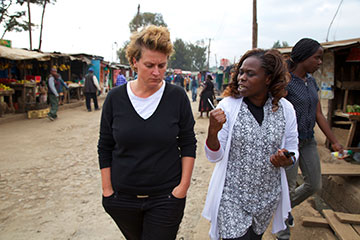
Charlotte Campbell became the rallying cry for Kiberan women who wanted to see change in their community.
“I wanted an African hairstyle,” she says, “but the women said I couldn’t have one because my hair is too slippery.”
She insisted they feel her hair to prove it could be styled like theirs, and before she knew it a dozen women were petting her, hooting and hollering and reaffirming what they already knew – it wouldn’t work. Rymer never ended up with the hairstyle she wanted, but she gained something even more valuable.
“It was only when the laughing ended that I realized this was the first time many of them had ever touched a white woman. At that moment I knew trust had been built between us.”
When Kiberan women developed trust in Rymer and Campbell, she says, is when they began to emerge from the shadows.
Throughout the film local women approach Charlotte to wish her well and pledge their support, even after her case is restarted de novo six times. Her effect on the community is evidenced throughout the film. In one scene a group of young girls learn to vocally disorient their attacker. In another a group of elderly women practice their left-jabs and right-hooks.
Rymer believes Charlotte Campbell revealed a crucial awareness to Kiberan women that had been lacking in their highly sexualized society.
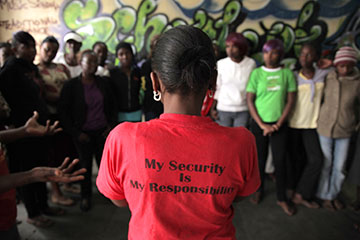
In response to Charlotte Campbell’s case and Judy Rymer’s film, women’s empowerment groups have sprung up throughout Kibera.
“It’s only through the voices and strength of Kiberan women that change will finally come to their community.”
The story of Charlotte Campbell as told by Judy Rymer’s “I Will Not Be Silenced” brought international attention to sexual violence in Kenya and trailblazed the need for Kenyan courts to establish a regimented legal procedure for combatting rape.
Today there is an initiative to ensure all police stations have a desk specifically for reporting sexual violence. There is even the explicit intention of having dedicated rape courts in the future.
Rymer is modest about the effect of her film on Kenyan society, but the proof is in the pudding: today “I Will Not Be Silenced” is screened at the initiation of each Kenyan magistrate.
When asked what moves her the most about the film, Judy Rymer points to an underlying thread in humanity.
“The ability of one person to create change is a universal experience.”
In the case of Charlotte Campbell, she created a world of change in the slums of Kibera.

